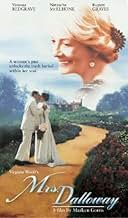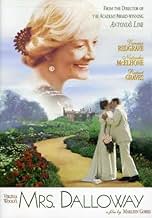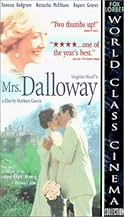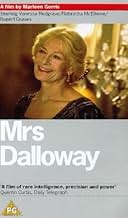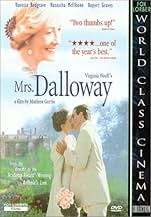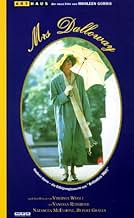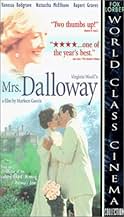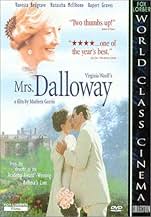Mrs Dalloway
- 1997
- Tous publics
- 1h 37m
IMDb RATING
6.5/10
4.4K
YOUR RATING
In 1923 London, socialite Clarissa Dalloway's well-planned party is overshadowed by the return of an old suitor she had known thirty-three years earlier.In 1923 London, socialite Clarissa Dalloway's well-planned party is overshadowed by the return of an old suitor she had known thirty-three years earlier.In 1923 London, socialite Clarissa Dalloway's well-planned party is overshadowed by the return of an old suitor she had known thirty-three years earlier.
- Director
- Writers
- Stars
- Awards
- 2 wins & 1 nomination total
- Director
- Writers
- All cast & crew
- Production, box office & more at IMDbPro
Featured reviews
Virginia Woolf is thought of as a high-brow rather than popular novelist yet the novel this film is based on sold well when first published in 1924. It is easy to see why there is nothing rarefied in the treatment of its themes, making choices and breaking with the past.
Clarissa Dalloway, a society matron, played with startled radiance by Vanessa Redgrave, is throwing a party and while making the arrangements she remembers back to the choice she made 30 years ago as a young woman between two men. One, Peter, charming, intelligent, adventurous, is the sort who went out and conquered India, or at least seduced the Major's wife. The other, Richard, good-looking, loving, a bit boofy, devoid of flair, is the sort that gravitates into politics. Naturally, the young Clarissa (played by Natasha Mc Elhone) has chosen the safe one, but Peter, after a chequered career, has turned up in London and pays her a call. She invites him to the party. Parallel to Clarisa's reminiscences is the story of Septimus (Rupert Graves) a returned soldier from World War I, whose wartime experiences are eating into his sanity.
Clarisa is put up as a `modern woman' who refuses Peter's love because she sees it as all demanding and all consuming, despite his attractive personality. Yet she accepts Richard, who wants and needs a dutiful, supportive wife. She also passes up the possibility of love with her close friend Sally. Though shaken when she hears of Stephen's fate from his psychiatrist, a guest at the party, and touched when she meets her old lovers again, she sees her life as going on before, safe and unexciting.
For a film-maker the amount of interior musing generated by Woolf's `stream of consciousness' writing technique presents a challenge and here Marleen Gorris has effectively used flashback to externalise Clarisa's memories. We get two stories artfully intercut, though there is not much tension in either of them - costumes, but not much drama. One does, however, get the feel of how it might have been to be in the upper class during the Edwardian late summer; as if just being there was enough (we even meet the Prime Minister at the party). Woolf and Gorris have evoked the atmosphere precisely, even if, as Lytton Strachey said, there isn't much of a plot. Even the minor characters sparkle. Robert Hardy as Sewell's psychiatist exudes bonhomie and guile, and Margaret Tyzak as the meddlesome Lady Bruton gives us a fine example of the old-fashioned female power broker at work. Overall, the film is rather slow, especially at the start, and I did wonder whether it would have been made without all the government and foundation money listed in the credits, but the quality of the performances redeem it to some extent.
Clarissa Dalloway, a society matron, played with startled radiance by Vanessa Redgrave, is throwing a party and while making the arrangements she remembers back to the choice she made 30 years ago as a young woman between two men. One, Peter, charming, intelligent, adventurous, is the sort who went out and conquered India, or at least seduced the Major's wife. The other, Richard, good-looking, loving, a bit boofy, devoid of flair, is the sort that gravitates into politics. Naturally, the young Clarissa (played by Natasha Mc Elhone) has chosen the safe one, but Peter, after a chequered career, has turned up in London and pays her a call. She invites him to the party. Parallel to Clarisa's reminiscences is the story of Septimus (Rupert Graves) a returned soldier from World War I, whose wartime experiences are eating into his sanity.
Clarisa is put up as a `modern woman' who refuses Peter's love because she sees it as all demanding and all consuming, despite his attractive personality. Yet she accepts Richard, who wants and needs a dutiful, supportive wife. She also passes up the possibility of love with her close friend Sally. Though shaken when she hears of Stephen's fate from his psychiatrist, a guest at the party, and touched when she meets her old lovers again, she sees her life as going on before, safe and unexciting.
For a film-maker the amount of interior musing generated by Woolf's `stream of consciousness' writing technique presents a challenge and here Marleen Gorris has effectively used flashback to externalise Clarisa's memories. We get two stories artfully intercut, though there is not much tension in either of them - costumes, but not much drama. One does, however, get the feel of how it might have been to be in the upper class during the Edwardian late summer; as if just being there was enough (we even meet the Prime Minister at the party). Woolf and Gorris have evoked the atmosphere precisely, even if, as Lytton Strachey said, there isn't much of a plot. Even the minor characters sparkle. Robert Hardy as Sewell's psychiatist exudes bonhomie and guile, and Margaret Tyzak as the meddlesome Lady Bruton gives us a fine example of the old-fashioned female power broker at work. Overall, the film is rather slow, especially at the start, and I did wonder whether it would have been made without all the government and foundation money listed in the credits, but the quality of the performances redeem it to some extent.
Like most of Virginia Woolf's literary output, I appreciated the film-version of "Mrs. Dalloway" more than I enjoyed it. There are flashes of blinding beauty in this movie, however, the film's "sum" is not equal to its "parts". Of course, Vanessa Redgrave continues to astound me with her talent. And ---yes, the film is beautifully made and attention to period detail is evident. And --- yes, parts of the story are very heart-rending. Yet.... why does this film satisfy me but not move me? Like a guest at one of Mrs. Dalloway's parties, I am more impressed with the effort that went into the production than the product itself.
This is a beautiful little film, which portrays the book admirably. When put up against its counterpart in The Hours I think it compares favourably. For sure it is a much smaller film in both stature and actor profiles, but this does not make it worse, in fact quite the contrary.
The English cast do a great job, on this essentially English story, with strong performances all around, notably from the leads from both eras. It is nicely shot, and the script has been well managed, and achievement for a Virginia Woolf novel.
I often find myself trying to pick out flaws in films like this, but the only possible complaint I can think of is the lack of continuity in height ratio between the leads over the two eras, petty some might say, and actually a small price you might expect to pay when you cast the wonderful Vanessa Redgrave.
I can't help feel sorry for those people who don't get this film. If Virginia Woolf isn't your cup of tea fair enough, but to think this and therefore the book is boring can only mean a lack of understanding or appreciation of Woolf's views on the point of life.
In essence when I watched this film it charmed me for an hour and a half, and then when it was finished left me questioning the value of my life, and important decision I had made, and was yet to make, which if you have ever read it is exactly what the book does.
The English cast do a great job, on this essentially English story, with strong performances all around, notably from the leads from both eras. It is nicely shot, and the script has been well managed, and achievement for a Virginia Woolf novel.
I often find myself trying to pick out flaws in films like this, but the only possible complaint I can think of is the lack of continuity in height ratio between the leads over the two eras, petty some might say, and actually a small price you might expect to pay when you cast the wonderful Vanessa Redgrave.
I can't help feel sorry for those people who don't get this film. If Virginia Woolf isn't your cup of tea fair enough, but to think this and therefore the book is boring can only mean a lack of understanding or appreciation of Woolf's views on the point of life.
In essence when I watched this film it charmed me for an hour and a half, and then when it was finished left me questioning the value of my life, and important decision I had made, and was yet to make, which if you have ever read it is exactly what the book does.
10anelson1
Everyone doesn't like everything, so I'm not surprised that some people find the movie of Mrs. Dalloway boring. They probably would find the book boring too. But it's depressing. So they won't agree with some of us who see the novel as one of the great works of the 20th century, and the film as a truly remarkable and beautiful capturing of it. The only touch I regretted was the opening of the film with the Septimus Warren-Smith war scenes. The opening really belongs with Mrs. D. and her first words, "I will buy the flowers myself." After that moment, it's a quiet day but a beautiful and sensitive one.
In 1923 London, socialite Clarissa Dalloway (Vanessa Redgrave) is planning a high class party. She is the wife of MP Richard Dalloway. Her daughter Elizabeth prefers do-gooder Miss Kilman than her. Her old suitor Peter Walsh arrives with a troubled love life and various failures. Meanwhile, former soldier Septimus Warren Smith (Rupert Graves) is haunted by the nightmarish Great War. His wife Rezia is concerned. The movie also flashbacks to a young Clarissa (Natascha McElhone), a young Peter, and best friend Sally (Lena Headey).
This is adapted from a Virginia Woolf novel. The Septimus side of the story is separated from Clarissa for most of the movie. That kept me at an arm's length as I waited for the two sides to come together. While interested in Septimus, it seems to repeat the same premise. He would be better to be in his own movie about a shell shocked veteran. When the sides finally collide, it's not as compelling as one wish. Of course, it's still interesting as a character study for Clarissa. It may work better in literary form. As for young Clarissa, I'm more interested in Sally than Peter. It may be salacious but that counts. Vanessa Redgrave is able to maintain interest for the most part. I can't say that this is exciting or thrilling in any way. She's a marginally interesting character.
This is adapted from a Virginia Woolf novel. The Septimus side of the story is separated from Clarissa for most of the movie. That kept me at an arm's length as I waited for the two sides to come together. While interested in Septimus, it seems to repeat the same premise. He would be better to be in his own movie about a shell shocked veteran. When the sides finally collide, it's not as compelling as one wish. Of course, it's still interesting as a character study for Clarissa. It may work better in literary form. As for young Clarissa, I'm more interested in Sally than Peter. It may be salacious but that counts. Vanessa Redgrave is able to maintain interest for the most part. I can't say that this is exciting or thrilling in any way. She's a marginally interesting character.
Did you know
- TriviaFirst screenplay written by Eileen Atkins.
- GoofsIn the flashback scenes with the younger actors, Peter is slightly taller than Clarissa. When they dance together at the party, he is considerably shorter than her.
- Quotes
Peter Walsh: [Talking about Clarissa in 1923] She broke my heart, and you can't love like that twice.
- SoundtracksTime for Old Time
Composed by Jack Trombey (as J. Trombey)
- How long is Mrs Dalloway?Powered by Alexa
Details
- Release date
- Countries of origin
- Language
- Also known as
- Virginia Woolf's Mrs Dalloway
- Filming locations
- Duke of York Column, St James's, London, England, UK(Mrs Dalloway coming back from shopping flowers)
- Production companies
- See more company credits at IMDbPro
Box office
- Gross US & Canada
- $3,309,421
- Opening weekend US & Canada
- $90,127
- Feb 22, 1998
- Gross worldwide
- $3,309,421
- Runtime
- 1h 37m(97 min)
- Color
- Sound mix
- Aspect ratio
- 1.85 : 1
Contribute to this page
Suggest an edit or add missing content


